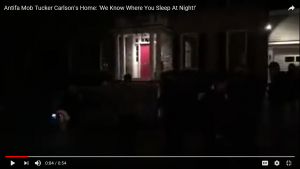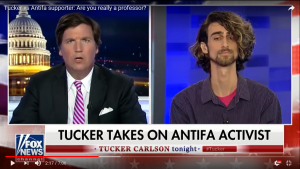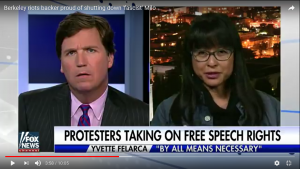(CNN announces legal action, after correspondent Jim Acosta banned)
CNN’s White House Correspondent, Jim Acosta had his press access to the White House revoked on November 8th. Now his network, CNN, is suing President Donald Trump and several aides.
However, Acosta is arguably not a journalist, but an activist. People are supposed to be there to cover the news and the White House, not to be antagonistic and grandstand. Here are some examples:
(Jim Acosta compilation)
(Acosta, on August 2, 2017)
(Acosta, July 1, 2018)
(Acosta, on October 29, 2018)
(November 6, 2018, which was Acosta’s last day)
The lawsuit claims that by revoking Acosta’s media access, his 1st and 5th Amendments (freedom of the press, and due process), were violated.
Here is the 1st Amendment:
Freedom of Religion, Speech, and the Press
Congress shall make no law respecting an establishment of religion or prohibiting the free exercise thereof, or abridging the freedom of speech or of the press, or the right of the people peaceably to assemble and to petition the government for a redress of grievances.
Here is the 5th Amendment:
Protection of Rights to Life, Liberty, and Property
No person shall be held to answer for a capital or otherwise infamous crime unless on a presentment or indictment of a grand jury, except in cases arising in the land or naval forces, or in the militia, when in actual service in time of war or public danger; nor shall any person be subject for the same offense to be twice put in jeopardy of life or limb; nor shall be compelled in any criminal case to be a witness against himself, nor be deprived of life, liberty, or property without due process of law; nor shall private property be taken for public use without just compensation.
CNN released the full text of the lawsuit, shown here. But let’s go through some of the more interesting sections. (Quotes in bold, comments in italics)
2. But on November 7, 2018, Defendants revoked Acosta’s White House credentials because, in the President’s own words, Acosta failed to “treat the White House with respect” at a White House press briefing.
Except if you watch that November 6 video, he wasn’t being respectful. He was being antagonistic.
4. And the revocation of Acosta’s credentials is only the beginning; as the President explained, there “could be others also” who get their credentials revoked.
The slippery-slope argument except it is unwarranted here. There aren’t other journalists in the press core who act the way Acosta does. Blatant fearmongering.
5. The Framers of our Constitution embraced a “profound national commitment to the principle that debate on public issues should be uninhibited, robust, and wide-open, and that it may well include vehement, caustic, and sometimes unpleasantly sharp attacks on government and public officials.” N.Y. Times v. Sullivan, 376 U.S. 254, 270 (1964). The President lacks the authority to quash “[t]he sort of robust political debate encouraged by the First Amendment”— debate that is “bound to produce speech that is critical of those who hold public office.” Hustler Magazine, Inc. v. Falwell, 485 U.S. 46, 51 (1988). That is why the D.C. Circuit has been clear that “the protection afforded newsgathering under the first amendment guarantee of freedom of the press requires that . . . access [to White House press facilities] not be denied arbitrarily or for less than compelling reasons.” Sherrill v. Knight, 569 F.2d 124, 129 (D.C. Cir. 1977). And “notice . . . of the factual bases for denial [of access to White House press facilities] with an opportunity to rebut is a minimum prerequisite for ensuring that the denial is . . . [not] based onarbitrary or less than compelling reasons.” Id. at 131.
This conflates a number of things: First, the press is there to cover the White House, not to DEBATE. Second, the 1st Amendment is to enshrine public talks and even unpleasant sharp attacks, but it doesn’t say that public figures MUST engage with you. Third, given Acosta’s frequent behaviour, it would be easy to rebut ”arbitrary or less than compelling reasons quite easily. Fourth, the 1st Amendment doesn’t guarantee access to the White House.
Jim Acosta seems to want a blank cheque to confront and badger White House staff at will.
27. The President dislikes CNN’s and Acosta’s coverage of him and his administration, and has made that clear since before he took office. At a news conference on January 11, 2017, for example, then-President-elect Trump told Acosta, “your organization is terrible.” Acosta responded: “You’re attacking us. Can you give us a question?” The President replied: “Don’t be rude. No, I’m not going to give you a question . . . . You are fake news.”
While these claims are true, Acosta’s frequent behaviour does make it clear he is there to agitate, rather than report on the news. But since CNN raised the issue of the 1st Amendment, would this not be going against TRUMP’S right to free speech?
33. Speaking through a hand-held microphone, as did all the White House journalists who asked questions, Acosta asked a question about one of President Trump’s statements during the midterm campaign—namely, whether a caravan making its way to the United States from Central America constitutes “an invasion” of the country, a significant feature of the President’s messaging during the just-ended campaign. The President declined to respond, instead remarking: “You know what? I think you should . . . I think you should let me run the country. You run CNN. And if you did it well, your ratings would be much better.”
- When Acosta attempted to ask a follow-up question, President Trump refused to take it. A White House staffer then approached Acosta and attempted to grab the microphone. The staffer reached all the way across Acosta’s body, successfully latched onto the microphone, and physically attempted to remove it from Acosta’s right hand. Acosta held onto the microphone, stated “Pardon me, ma’am,” and continued to ask his question.
This is a distortion of the truth. Acosta attempted to ask several questions, and was argumentative the entire time. Footage available refutes these assertions.
39. Hours after the press conference concluded, Press Secretary Sanders issued an official statement announcing that “the White House is suspending the hard pass of [Acosta] until further notice.” The Press Secretary accused Acosta of “placing his hands” on the White House staffer who attempted to take the microphone from Acosta during the press conference. The Press Secretary added that the alleged conduct “is absolutely unacceptable” and stated “[w]e will not tolerate this inappropriate behavior.” The White House’s statement indicated that this alleged “incident” was the basis of its decision to revoke Acosta’s credentials.
Whether this was deliberate or not is up for debate in the video. However, it was clear that Acosta was making a nuisance of himself.
FIRST AMENDMENT ARGUMENT
57. Defendants have deprived Plaintiffs of their right to access the White House grounds by revoking Acosta’s White House credentials. Without those credentials, Acosta cannot access the White House and cannot effectively serve as a White House correspondent, thus depriving Plaintiff CNN of its chief White House correspondent.
CNN is not prohibited from covering White House press briefings, only Acosta is. Do they not have anyone else on staff who could do it?
59. Defendants’ justifications for impeding Plaintiffs’ First Amendment rights are hollow and hardly sufficiently compelling to justify the indefinite revocation of Acosta’s White House credentials. Consequently, the only reasonable inference from Defendants’ conduct is that they have revoked Acosta’s credentials as a form of content- and viewpoint-based discrimination and in retaliation for Plaintiffs’ exercise of protected First Amendment activity.
Except Acosta wasn’t banned for his views. He was banned for regularly disturbing press conferences.
FIFTH AMENDMENT ARGUMENT
65. Acosta received no direct notice from the White House that his credentials had been revoked, let alone any notice prior to the revocation. Instead, the White House announced the revocation itself via Twitter after Defendants already decided to effectively ban Acosta from the White House grounds.
- Defendants did not provide Plaintiffs a written explanation, nor any explanation at all, before revoking Acosta’s press credentials. The only written explanation was a short statement posted on Twitter that Acosta was suspended because he “plac[ed] his hands” on a White House staffer. Even if this tweet were accurate—and it is not, as the reportedly doctored video Defendant Sanders posted would later show—it would not suffice to demonstrate prior notice of the revocation.
Okay, giving him notice would have been courteous, but is not grounds for suing. Nor is oral notification over written notification
Some Thoughts
While many media heads are supporting Acosta’s reinstatement, I believe this claim to be completely bogus.
(1) Acosta has been repeatedly rude and antagonistic to the White House staff. He is clearly being an activist, not a journalist. This is seen again and again on tape. No one else behaves this way, and it is surprising that his behaviour has been tolerated for so long.
(2) Acosta is not banned or restricted from exercising free speech at home or in public. He is just not allowed into White House briefings
(3) CNN is not banned from covering the White House. They just need a new correspondent.
(4) Not being given notice is rude, but not a constitutional violation.
The judgement is expected any day, and a followup will be provided.
Update to the Story
On Friday, November 16, a DC Judge ordered the press credentials to be temporarily returned to Jim Acosta while the matter is formally resolved. Personally, this was a surprise.
From CNN’s reporting on the story:
Trump said the same thing during a Q&A with reporters in the Oval Office.
“People have to behave,” he said, when asked about the administration’s defeat in court.
“If they,” meaning reporters like Acosta, “don’t listen to the rules and regulations, we’ll end up back in court and we’ll win. But more importantly, we’ll just leave,” meaning, stop taking questions from the press. “And then you won’t be very happy. Because we do get good ratings.”
While Acosta seems to be allowed back in, there is nothing to stop the White House from: (a) simply refusing to call on Acosta; (b) cancelling press conferences; or (c) throwing Acosta out for the day.



